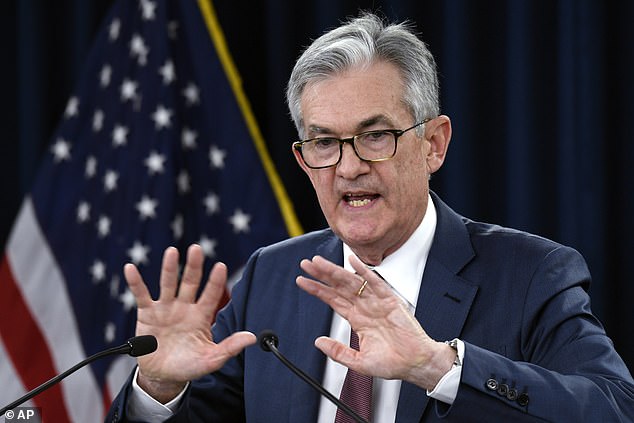The Federal Reserve’s interest rate hold should come as no surprise.
Chairman Jay Powell is determined to preserve the US central bank’s independence, Trump’s tariffs are a threat to domestic prices and the ramping up of American pressure on Iran is nerve-racking.
One needs no reminder of how Russia’s war on Ukraine caused a major inflation shock as energy costs soared.
If it were not for these factors, the Fed, and for that matter the Bank of England, would be wise to get on the front foot by cutting borrowing costs.
Former World Bank boss David Malpass, writing in the Wall Street Journal, argues the Fed is behind the curve in lowering rates as the US economy weakens.
He points to the loss of 700,000 jobs, strain among small businesses and argues that the prime borrowing rate of 7.5 per cent and credit card costs at 20 per cent are too high.

Defiant: Federal Reserve chairman Jay Powell (pictured) is determined to preserve the US central bank’s independence in the face of fierce criticism from President Trump
The bunker-buster in the room is the Middle East. The Ukraine war demonstrated how speedily geopolitics can spin off into an economic and fiscal crisis.
The reason why so many Western democracies are sitting on unacceptable debt piles, inhibiting capacity for growth, is unmet costs and subsidies which came after energy prices spiralled.
Nevertheless, 2025 is not 1973 when an Arab oil embargo started an economic catastrophe which saw inflation rocket, interest rates soar, recession and Britain forced to the IMF for a bail-out.
Oil-induced inflation also drove Jimmy Carter out of the White House. Energy production is robust and diversified enough to deal with anything less than a cataclysm which causes energy taps across the Arabian Gulf to be turned off.
Saudi Arabia is stepping up production, Guyana has become an oil gusher, Brazil and Canada are major drillers, and US production hit a record 13.5m barrels in March.
It has long been a concern that the Fed and the Bank of England would make the same error as inflation tumbles from its peaks as they did when it mounted, and assume the decline is ‘transitory’.
By holding rates higher than they need to be, they are punishing business, consumers and home-buyers, and risking an avoidable downturn.
Should the tumult in the Middle East retreat, interest rate-setters must be alert to the need for bold rate cuts.
Drill, baby, drill
The hike in Brent crude prices, since Israel’s attack on Iran, will come as something of a relief to BP.
As it pivots back to oil and gas, after backing a green future, the higher the oil price, the stronger the cashflow.
Moreover, with aggressive activist investor Elliott on its case, a volatile oil price offers the opportunity to ramp up trading – a key money-spinner.
Fossil fuels are disparaged by green campaigners. But one shouldn’t lose sight of the contribution that BP, which began life as the Anglo-Persian oil company, makes to the British economy.
As reported today, BP analysis shows that the oil giant made a £7.4billion contribution to UK plc last year.
It paid £1.2billion in corporation tax and bolstered the exchequer by a further £2.2billion indirectly in the shape of excise duties, employees’ income tax, National Insurance and VAT.
There has been speculation that a weakened BP could be swallowed by London-listed Shell or one of the US majors like Chevron or Exxon.
Britain would be much better served if it maintained its independence. BP’s global reach into markets such as India and Indonesia is invaluable.
Given the current dislocation in the Middle East, the Government would be wise to end the daft embargo on new North Sea oil licences.
To do so would provide a much-needed fillip to drillers and Aberdeen-based engineering services.
Spanish lift
Tracking Ocado’s business model is tricky as its topsy-turvy share price, 24 per cent down this year, shows.
It struggles to be viewed as the Amazon of global grocery, as once hoped.
Yet it is encouraging to see that the company’s first international customer in 2017, the Catalan supermarket group Bon Preu, is coming back for more of the UK group’s robotic systems with a new warehouse in Barcelona.
DIY INVESTING PLATFORMS

AJ Bell

AJ Bell
Easy investing and ready-made portfolios

Hargreaves Lansdown

Hargreaves Lansdown
Free fund dealing and investment ideas

interactive investor

interactive investor
Flat-fee investing from £4.99 per month

InvestEngine

InvestEngine
Account and trading fee-free ETF investing

Trading 212

Trading 212
Free share dealing and no account fee
Affiliate links: If you take out a product This is Money may earn a commission. These deals are chosen by our editorial team, as we think they are worth highlighting. This does not affect our editorial independence.












